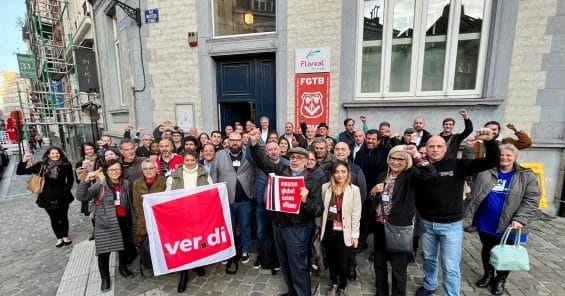How do we address the crisis in long-term care? UNI Europa Care hold high-level roundtable
04.04.23
UNI Global Union’s European Care Sector (UNI Care Europa) and its affiliates organized a high-level round table meeting focusing on solutions to the ongoing worker shortages in long-term care.
Participants came away from the meeting with a political commitment to continue to jointly address labour shortages in the care sector at the EU-level, to develop further work on violence and harassment in the care sector as well advance investments into the workforce.
The discussion, part of the European Commission funded RETAIN project (VS/2019/0292), was the follow up to an in-depth report released last year.
The event was attended by labour leaders, MEPs – Sirpa Pietikäinen (EPP), Evelyn Regner (S&D), and Dr. Pierrette Herzberger-Fofana (Greens/EFA) – and employers like Korian and the Catholic Church, one of the largest long-term care providers in the world. In total, UNI and its member unions welcomed 67 participants from 48 organizations across 17 countries.
UNI Europa Regional Secretary Oliver Roethig put collective bargaining as a necessary condition for improving working conditions, recruitment and retention. “Collective bargaining coverage in the sector follows the fragmented organization of long-term care, and we must ensure that all care workers are able to have collective agreements regardless of their employer or workplace,” he said.
Monsignor Robert Vitillo of the International Catholic Migration Commission stated in a similar vein: “our present Pope Francis [has] condemn[ed] abuses of work, to recognize the rights of workers to self-organize and to engage in collective bargaining, and to affirm the centrality of work for integral human development.”
Dr Pierrette Herzberger-Fofana, MEP, pointed out the importance of taking racial discrimination of care workers seriously. Many migrant workers and people of colour face racial discrimination from care-users and companies need to put mechanisms in place to safeguard their employees, including encouraging unionization of their facilities. The latest figures presented by Eurofound’s Viginta Ivaškaitė-Tamošiūnė only confirmed this. Attacks and harassment of care workers were twice as likely to occur as to those working in other sectors.
Rachel Harrison, National Secretary GMB, argued that care workers are professionals in their own right and should be recognized as such, adding “to suggest that volunteers, with potentially no experience of care work, could do the jobs without issue, undermines care work completely.”
While the protection of workers’ rights through unions is essential to addressing the issue, there are other key reforms needed.
MEP Regner said the Pay Transparency Directive, which enshrines the principle of ‘equal pay for work of equal value,’ will be a game changer for care workers. MEP Pietikäinen thanked eloquently laid out why care is the most important gender issues of the day, and that it needed more far-reaching action on behalf of the European Commission.
Other participants brought up the EU Care Strategy which identified labour shortages as a pressing issue in the long-term care sector, but unions, employers’ organisations and other stakeholders feel that its propositions fell short of expectations.
The roundtable also addressed the disproportionate attacks and harassment that care workers faced on the job, which were found to be associated with understaffing and higher levels of stress.
Korian Director of Social Relations Mathilde
In his closing remarks, UNI Care Europa President Pierangelo Raineri underscored the negative impact of high labor turnover on trade union membership, making it a major obstacle to organizing workers in the care sector. He added that the high-level roundtable had strengthened the group’s cooperation with care users’ groups, institutional investors, employers and their organizations, several governments, and other key stakeholders.
With the hope of improving workers’ lives, building stronger unions, and developing solutions to pressing issues, UNI Care Europa and its affiliates continue to fight for the rights of care workers. For more information, please contact UNI Care Europa Director Mark Bergfeld.
UNI Europa


